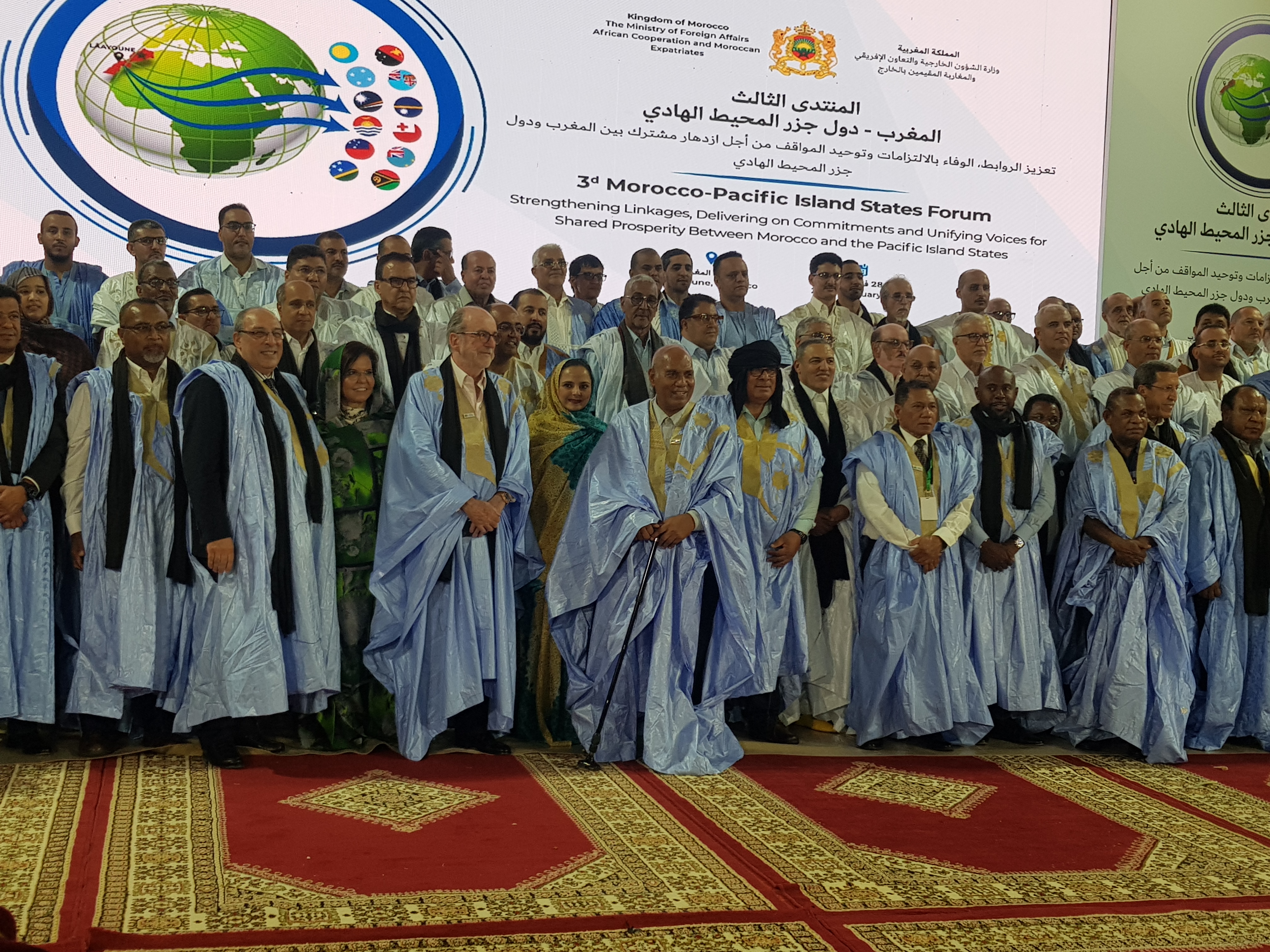I first saw the Atlas mountains over the shoulder of a senior colleague when we were airborne and off to Laayoune, a Western Sahara city administered by Morocco.
Rich with resources, the Atlas mountains stretch 2,500km, spanning Morocco, Algeria and Tunisia, and separating the Atlantic and Mediterranean coastlines from the Sahara desert.
The view below was incredible. I could see craggy peaks dotted with pretty Berber villages carved out of the landscape.
As the plane entered Laayoune airspace, the view changed to some green fields scattered here and there in the surrounding sands that encircled the city.
Described as the jewel of the desert, Laayoune wears a new look when night falls – streets light up, buildings illuminated, roadside restaurants brimming with people, state buildings sparkle. I was there for the 3rd Morocco-Pacific Island States forum. One night, I walked more than one hour relishing the city’s treasures.
Laayoune offers many unspoiled places to explore, and tastes and experiences to savour. From the treasures of the Lamsayad, an oasis 19km outside the city, with palm and acacia trees, to desert camp racing, traditional Sahrawi tea and Foum Elwad beach (the River’s Mouth in English), Laayoune is known for its rich culture, striking scenery and outdoor adventures.
The Sahrawi tea, called atay, is the people’s symbol of hospitality, so I was told. I was first introduced to the tea by a Gambian friend, Ebrima Jallow, last year in Beijing, China. Every evening, we would gather in Ebrima’s apartment, discussed Africa’s developmental challenges over cups of atay. In Laayoune, I savoured the tea with traditional Sahrawi cookies.
The city has received heavy investment by Morocco; since the late 1970s, a number of new schools, roads, sporting facilities, and housing developments, as well as a sizable desalination plant, have been constructed there.
Laayoune strives to preserve its Saharan look while embracing modernity. The impressive transformation it has witnessed in recent times makes little or no change to the face of the city.
Despite its beautiful scenery, Laayoune and other Western Saharan cities are yet to find a permanent legal status since the departure of the Spaniards.
Amid the controversy surrounding the Sahara region’s legal status, some African countries opened diplomatic missions in Laayoune and Dakhla.
Burundi and Djibouti are the latest African countries to open general consulates there, and the inaugurations coincided with the 3rd Morocco-Pacific Island States Forum held in Laayoune.
Morocco’s Foreign Affairs Ministry said the decision to hold the meeting in Laayoune followed the city’s milestone in diplomatic achievement.
Cote d’Ivoire, Central African Republic, Sao Tome and Principe, Gabon, Comoros, Gambia, and Guinea have all opened consulates in Laayoune and Dakhla. Liberia also announced recently that it plans to open its consulate in Laayoune soon.
“At the beginning of the year 2020, we thought that we will have ten by year end, but we reached that figure in jus two months,” Moroccan Foreign Affairs Minister, Nasser Bourita, said on the sidelines of the forum.
“These countries have shown, through statements, their support to the Moroccan position, and today, have decided to show it in the strongest diplomatic way,” he added.
The inaugurations of these diplomatic representations drew response from Algeria, the main backer of the Polisario Front, the movement pushing for Western Sahara independence. Algeria recalled its ambassador from Cote d’Ivoire for consultation when the West African country opened a consulate in Laayoune.
But Bourita dismissed Algeria’s response, saying Morocco is focus on deepening diplomatic ties with “those who want to build and improve partnership”.
“In diplomacy and politics, there are always those who want to build and those who want to destroy. Morocco has always worked and chosen to build partnerships with a number of countries. And we don’t focus on those who want to demolish but only on those who want to build and improve partnership. This is the vision of the royal majesty,” he said.
The minister described the city as “the symbol of South-South cooperation and Morocco’s link with developing countries”, saying the kingdom aims to “turn Laayoune into a main meeting and conference city with an increasing number of diplomatic missions.”
Why the forum?
It disturbs one’s sense of reasoning that an African country jumped two oceans to the south Pacific to establish a multi-lateral cooperation forum. But Morocco believes that distance is not, and shouldn’t be an impediment to genuine partnership.
“The challenge of climate change and pandemics is global and the response should also be global,” the kingdom’s chief diplomat said.
“Solidarity has no limit and border. Solidarity is a global concept for Moroccan people. Where we can offer, we will offer. We are doing it in the Arab world, Africa, Caribbean and the Pacific,” Bourita said.
Morocco and the island nations from the Pacific share several values and principles, said the foreign minister, citing the attachment to South-South cooperation and similar challenges.
The Prime Minister of Tonga, Mr Pohiva Tu’i’onetoa, corroborated this, saying Morocco and the Pacific nations may be far apart on geographical locations, but global challenges such as global warming, global health epidemics and economic misfortunes have brought them much closer.
Morocco will share its expertise and know-how with the Pacific island countries “with humility, sincerity, and full respect for the needs and specificities of each state,” Bourita said, explaining that the forum served as a platform to matchmake giver and taker.
“We have decided to send missions of experts to the Pacific island countries to identify specific areas of cooperation and set up training programmes and twinning projects between Moroccan cities and these countries to share experiences in areas of common interest such as the promotion of seafood and fisheries,” he stated.
The forum focused on training, food security, health and climate change, which, according to Laayoune Declaration, represents the gravest of threats to the survival and viability of island nations as a result of rising sea level.
United States, China and India are world’s biggest carbon emitters, accounting for 85% of the net increase in emissions, according to a 2018 report by the International Energy Agency (IEA).
The small islands states, which barely contributed, suffered disproportionately and unfairly from the effects of global warming, Bourita said, noting that how the world deals with it would determine the survival of these states.
Morocco, he said, has a modest experience and is ready to share to solve human’s common challenges. “This is what south-south cooperation is all about. It is a small contribution Morocco is making to challenges these countries are facing,” the foreign minister said.
Genuine partner
Despite the distance, the Pacific Islands states consider Morocco as a genuine partner in development.
“We believe Morocco is a genuine partner of the Pacific islands striving hard to help them deliver meaningful and impactful development by focusing on empowering communities threatened by climate change,” Secretary General of island nations’ regional bloc, Mr Ratu Solo, told Daily Trust on the sidelines of the forum.
To the island states, Solo said the forum was an important platform to exchange best practices on renewable energy and tackle the problem of climate change.
“For us, the objective is how to build a resilient communities in the Pacific from the lessons learnt from Morocco, in the areas of climate action, renewable energy and ocean management. To the Pacific Islands, climate change is the main development challenge, it impacts food, health, education, infrastructure, our way of life and our very existence,” he said.
The islands need a renewable energy which they could not afford, Solo said, noting that “the cost is too high and one of the discussions here was how to bring down the cost of the technology to benefit our people.”
He said the Pacific island nations were impressed by the level of development in Laayoune and commended the vision of King Mohammed VI to turn the desert outpost into a modern metropolis. “There are numerous construction sites and the work being done to help elevate the welfare of the local people, is commendable,” he said.
The forum’s outcome
The three-day meeting was attended by representatives from Morocco, Fiji, Kiribati, Marshall Islands, Micronesia, Nauru, Palau, Papua New Guinea, Samoa, Solomon Islands, Tonga, Tuvalu, and Vanuatu.
It ended with the heads of the delegations reaffirming their common attachment to the principles of sovereign equality, the political independence, and the territorial integrity of States.
The ‘Laayoune Declaration’ issued after the meeting said the leaders considered that Moroccan Autonomy Initiative was the only and unique solution to the regional dispute on the Western Sahara.
“We support the efforts led under the exclusive aegis of the United Nations towards achieving a realistic, practicable, and enduring solution to this regional dispute in full respect of Morocco’s territorial integrity and national sovereignty,” it said.
The communique reaffirmed their commitment to strengthen cooperation between Morocco and the Pacific Islands States for the mutual benefits of their countries, within the framework of South-South Cooperation, in the spirit of solidarity and in line with the national priorities.
It said in this regard, the Government of Morocco intends to continue providing support for the participation of the Pacific Islands States in the Conference of Parties of the United Nations Framework Convention on Climate Change.
“We remain concerned about the adverse impacts of climate change, especially those related to coastal erosion, sea level rise, natural disasters and extreme weather events, which continued to pose a significant risk to Pacific Islands States and to their efforts to achieve sustainable development and, for many, represent the gravest of threats to their survival and viability, including, for some, through loss of territory, as well as through threats to water availability and food security and nutrition.
“In this regard, we will endeavour to strengthen dialogue and cooperation, through innovative approaches and solutions, exchange of experiences and good practices, South-South Cooperation and triangular cooperation, and capacity building particularly in the fields of food security and nutrition, health, sustainable tourism, integrated coastal zone management approaches, renewable energies, education and training,” the communique said.




